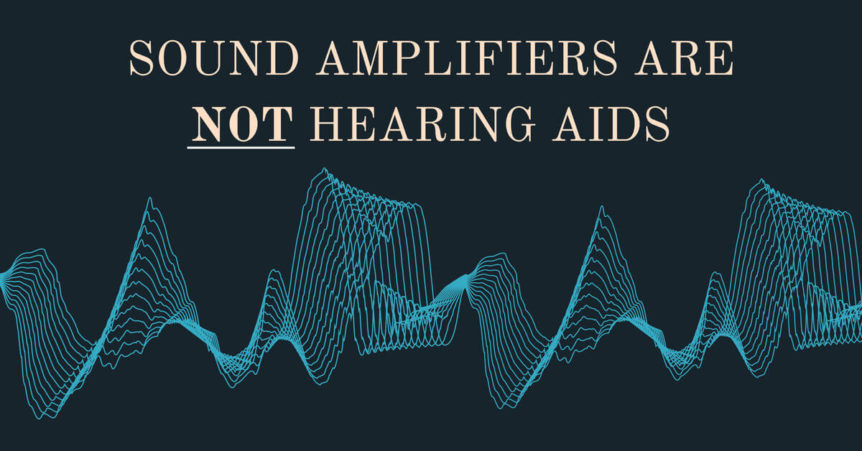Hearing technology has grown and expanded in leaps and bounds over the past several decades, developing innovative new ways to effectively treat permanent hearing loss. While reliable companies in the business of hearing aids continue to increase the power and adaptability of new hearing aids, the market has also exploded with untested and unreliable options.
When it comes to treating hearing loss, quality matters. Hearing aids are an investment. Reliable and effective hearing aids make use of tiny microprocessors that amplify sound in a nuanced way that reflects the patterns of your hearing loss. Solutions that haven’t been properly tested or offer one-size-fits-all answers are most often a recipe for dissatisfaction, discomfort and frustration.
Recently, many drug stores and retail outlets have been offering “sound amplifiers” ready-to-wear ear devices with a small price tag and big promises. Sound amplifiers make claims that aren’t medically supported and can ultimately damage your hearing if used as replacements for hearing aids.
Marketing Tricks
Because sound amplifiers can be sold without any proven effectiveness or medical benefit, the FDA requires that they cannot be marketed as a way of improving impaired hearing. However, the packaging for these devices often doesn’t clarify that it isn’t designed to aid hearing loss, simply avoiding its medical validity while boasting to improve the clarity of environmental sound.
Sometimes packaging will include small print statements that acknowledge that sound amplifiers are not made to be used as treatment for hearing loss, but often this message is obscured or drowned out by its alluring claims of effectiveness.
Sound amplifiers rely on their price point to convince people to buy them. While quality hearing aids cost in the thousands of dollars, sound amplifiers can be purchased for around thirty dollars. The difference in price also represents a difference in accountability and effectiveness. Sound amplifiers have no data on their effectiveness or statistics to support their claims.
Consumer Risk
Treating hearing loss effectively with hearing aids is an investment, and many hearing specialists have advice and financing resources to help make quality treatment more accessible. There also exists an entire market of unreliable products and hearing aids, many of them posing as online deals and one-size-fits-all alternatives to brand name hearing aids. Unfortunately, the minimal savings rarely deliver an actual deal. Working with an audiologist or hearing specialist can help you find the right hearing aid for you and make sure it is custom fitted to your ears and custom programmed to reflect your individual hearing loss. While working with hearing professionals and trustworthy brands prioritizes support, when hearing devices sold as online deals malfunction (or fail to function in the first place) no one is accountable for a less than ideal device.
Don’t Let Sound Amplifiers Keep You from Hearing Health
The increased availability of sound amplifiers may have the unintended consequence of keeping people with hearing loss from seeking real treatment. Sound amplifiers aren’t hearing aids and whatever amplification assistance they can provide doesn’t match the powerful and nuanced solutions modern hearing aids offer.
Several things are at risk when people believe a sound amplifier can replace or delay treatment with a hearing aid. First, the limits of sound amplifiers can disappoint people and lead them to believe that tested hearing aid technology is just as limited. While reliable hearing aids provide amplification to the exact frequencies you need, sound amplifiers may or may not offer the amplified sound you need to hear better. Chances are they will not, but they shouldn’t discourage people with hearing loss from finding better solutions.
Sound amplifiers can also damage your hearing health by creating the illusion you are treating your hearing loss. Treating hearing loss effectively can improve your overall health and quality of life, but sound amplifiers are not designed to effectively treat hearing loss. By leading people to think they have treated their hearing loss “enough” the use of sound amplifiers in place of hearing aids can keep people from hearing tests and proper diagnosis.
Custom Hearing Solutions
If you’re dealing with hearing challenges, don’t cut corners, work with people you can trust to find treatment that meets your needs. At Custom Hearing Solutions we offer quality hearing treatment to suit your hearing needs and your lifestyle. Why wait on quality hearing care? Set up your next appointment with us today.

